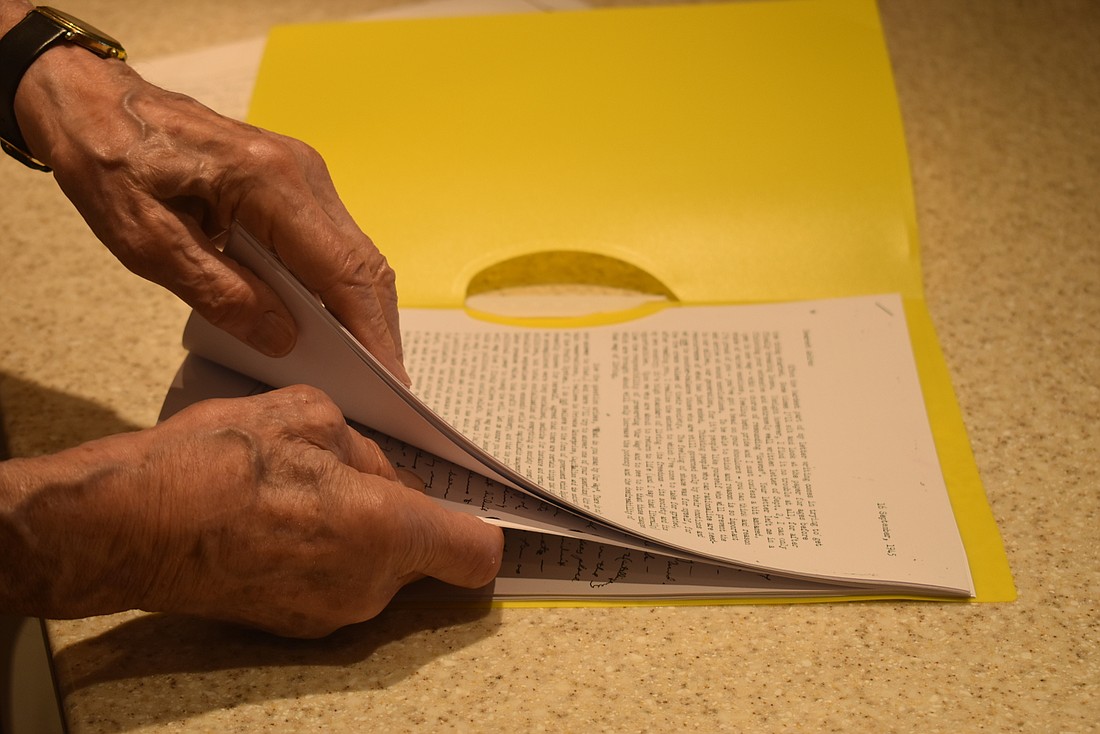- April 24, 2024
-
-
Loading

Loading

Longboater Stan Horwich picked up the phone recently and was shocked to learn he was speaking to an Australian woman, calling from the other side of the world, Sydney, Australia.
Though he didn't immediately realize it, the roots of the call from a woman named Marilyn Atkinson, across a half-day of time difference, reached deep into the past — 74 years to the wartime South Pacific, to be exact.
But at first, it seemed like something simpler, more routine and possibly nefarious.
“I would’ve thought it was a scam,” Horwich’s wife, Budee Jacobs, said of the call received earlier this summer at their Longboat Key home. “But he answered the phone and could tell by the accent.”
Who was on the line? And why?
First, a few facts.
Horwich served for more than three years in World War II with the Army Air Corps' Fifth Air Force. During his service, he was based in New Guinea, the Philippines and Okinawa.
While on leave from New Guinea in 1942, Horwich visited Sydney and found himself on the famous Bondi Beach, once of Australia's most iconic locations. That's where he met Moira Joan Teresa McLean.
Now, that Aussie accent on the phone in 2019 begins to make sense.
“We hit it off,” Horwich said simply of Moira.
They were young, and she was beautiful and intelligent, Horwich said.
They spent much of the two weeks of his leave together. He saw her again on another leave. The two then corresponded until 1945.
“You just don’t know how much I miss you,” Horwich wrote in one of his missives.
The handwritten letters back and forth across the Pacific, some written on Air Corps stationery, grew into a stack. Eventually, though, they became less frequent, eventually stopping altogether after about three years. Horwich can’t recall exactly why but surmises distance might have had something to do with it.
“She was a lifetime away,” he said. “I guess it had run its course. It would not have been a convenient relationship.”
Moira once wrote that she wanted to marry Horwich and live in “West Constant” — or rather, Wisconsin. The marriage notion never made it far, Horwich said, and was likely more based on her desire to get away from home for the first time and see the world.
The content of their letters was often political discussion rather than romance, though Horwich frequently signed his with “Love, Stan.”
“I must’ve made an impression,” he said.
Years passed, and Horwich never returned to Australia. He married, and so did Moira.
That was that, a beautiful wartime memory long past. But that stack of letters Down Under recently resurfaced and a reconnection, of sorts, took place.
Moira died at the age of 87. And in the process of going through her things, her family found the letters from Horwich.
Atkinson, Moira’s daughter, used the internet to search for Horwich with just a few clues —his connection to Chicago, his age, his military service — not sure what she'd do if she ultimately found her mom's wartime acquaintance. With a little luck, some tantalizing clues and a connection to the Longboat Observer, she found the right man.
Along the way, Atkinson found another Stan Horwich in the right hometown of Chicago, who in a storybook turn of events, knew the Longboat Key man. He suggested she turn her search here.
“Kismet!” Jacobs said.
"The last thing we intend is to intrude or insinuate ourselves into the lives of others who are now in their nineties,'' she wrote to the Observer, seeking help though ultimately fiinding Horwich on her own.
“She (Atkinson) was quite dogged,” said Jacobs, who this summer received the package of letters from Australia.
He keeps the copies in a yellow folder, sometimes finding it hard to read his own handwriting.
In the letters, sometimes he greets Moira with a Tagalog phrase before getting into a discussion of the politics of war and the world.
Sometimes he tells her how he misses her.
"The letters are so wonderfully historic and personally reflective of events in 1945 that we thought Stanley Horwich and his family may like copies of his letters describing his wartime experiences and the people with whom he served,'' Atkinson wrote. "1945 was certainly a big year in history."